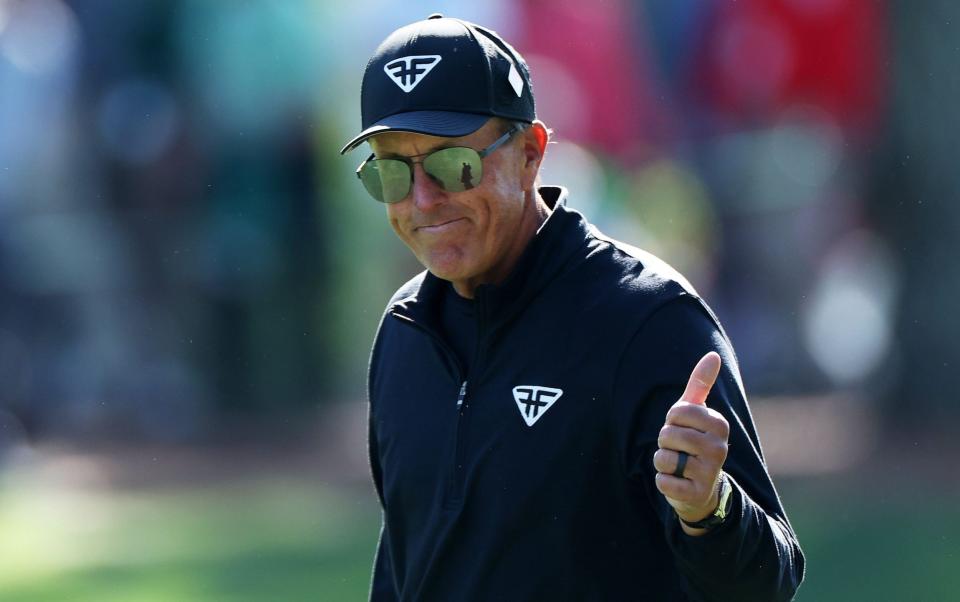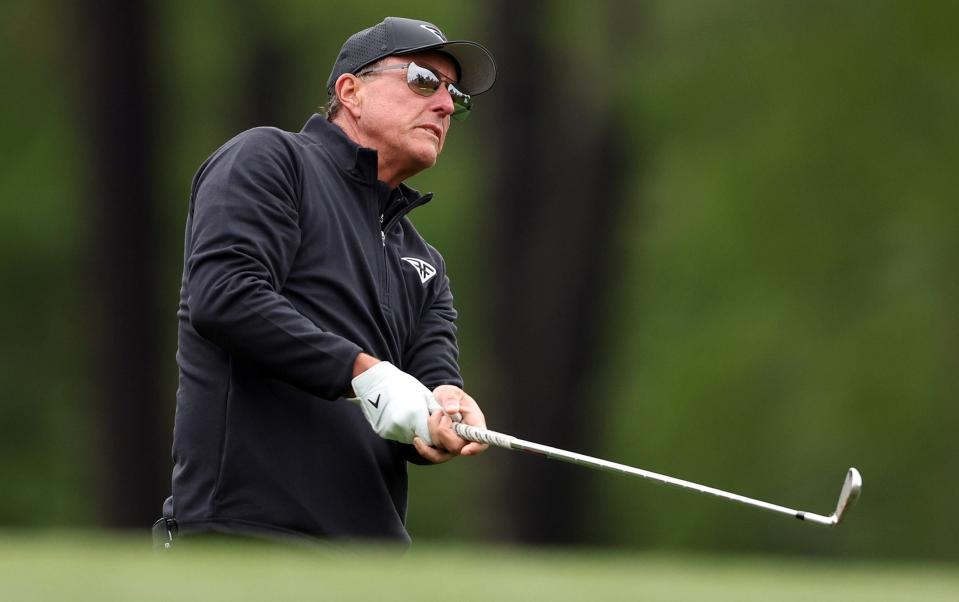Phil Mickelson is a villain? Nobody told the crowd at The Masters?

Trust the man in black to spring from the evening shadows. Phil Mickelson, in a charcoal outfit that looked like a cross between a Johnny Cash tribute and a play on his notoriety as an agent of darkness, electrified Masters Sunday as only he knew, posting a stunning final-round 65 that ensured his 30th appearance here at Augusta would end amid the highest drama.
Flashing that trademark goofy grin behind his aviators, Mickelson was behaving and playing as if it were 2004, the year of his first Green Jacket, all over again. Even at 52, with his reputation bruised by withering criticism of his defection to LIV Golf, the three-time champion reaffirmed his status as the game’s ageless wonder, detonating roars all through the tree-lined canyons of this fabled back nine.
Mickelson knows when to take his chances once he has the scent of glory. As the architect of one of its greatest shots, a 216-yard six-iron off the pine straw to set up his third triumph in 2010, he has the courage of his convictions on this, the grandest stage. To think, he had started his Masters week as persona non grata, reportedly saying almost nothing at the champions’ dinner in response to the vitriol roused by his £160 million move to the Saudi-bankrolled breakaway tour. Now he was feted as the people’s favourite once more.
Clubhouse leader. #themasters pic.twitter.com/knz660UE7F
— The Masters (@TheMasters) April 9, 2023
Given he has gained far greater publicity for his political machinations than for his golf these past 12 months, Mickelson provoked incredulity among the patrons as he surged back up the leaderboard. The only person not surprised was the man himself. “I knew I was close,” he said. “I’ve been hitting quality shots, so this doesn’t feel like a fluke. I didn’t make loose swings at inopportune times. I stayed very present and calm throughout, and I had a blast.”
Plenty have excoriated Mickelson over his decision to throw in his lot with the Saudis. Rory McIlroy savaged him last year as “naive, selfish, egotistical, ignorant” for admitting that he was using LIV to generate leverage with the PGA Tour. But what can never be disputed is Mickelson’s capacity to bring the pyrotechnics at major championships.
Already the first player to win a major in his 50s, at the 2021 USPGA, he came extraordinarily close to seizing his seventh title overall here, denied only by the poise and creativity of Jon Rahm. So dramatic was Brooks Koepka’s unravelling, allowing a four-stroke Friday lead to become a four-shot deficit 48 hours later, Mickelson, poster boy for the renegades, wound up as the joint highest-ranked LIV player.
There was to be no mass invasion of the 18th green, as LIV ringmaster Greg Norman had promised in the event that one of his signings walked off with the ultimate prize. But Mickelson and his fellow rebels could count this as a fruitful week’s work. Their worry was that this tournament would confirm their competitive irrelevance, with PGA Tour loyalists waiting to crow about their former colleagues choosing money over prestige by playing in 54-hole exhibitions. Instead, both Koepka and Mickelson proved that the fires still burned.

While Koepka’s Sunday collapse suggested he had lost the art of sustaining a challenge over all four days, Mickelson reminded even his detractors that he was a champion of the finest vintage. His second shot to the 15th, flying the ball 267 yards over the water en route to the third of five birdies on the homeward half, underlined how he was never better than when the adrenalin coursed through him.
“I have a unique opportunity,” Mickelson explained. “I’m 52, I have no injuries, no physical problems, I’m able to swing a club the way I want to, to do things in the game that not many people have the chance to do in later life.”
Mickelson evidently does not regard himself as some faded nostalgia act. He refused to depict this astonishing closing round, the lowest in his three-decade-long Masters career, as some unexpected bonus, instead calling it a “springboard” for even finer flourishes for the rest of the season. There was some merit to this story: after all, only a poor putting performance in his third round deprived him of the opportunity to chase Rahm to the wire.
At times during the LIV soap opera, it has felt as if Mickelson had thrown away even the faintest vestiges of public goodwill, as if he were fated to be recorded in history as a mercenary, an agitator, a saboteur. This has been a week to demonstrate how capricious society’s judgement can be. As he made this stirring charge, the impulse was to remember only the traits that made him so adored in the first place: The flair, the devil-may-care attitude, the exhilarating fearlessness. It was a tonic to see the real Mickelson ruling over his manor once more.

